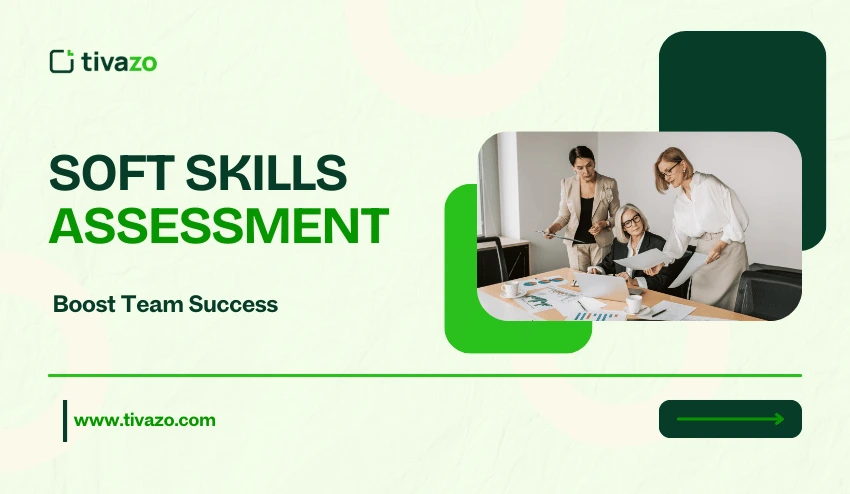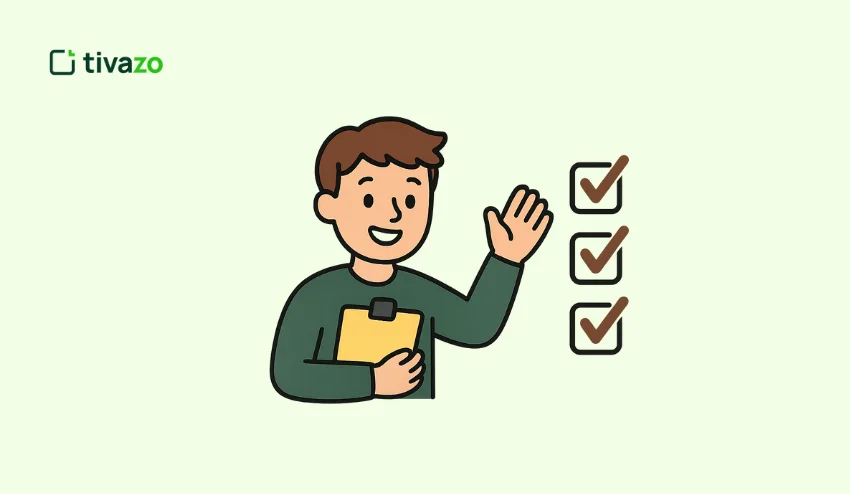Forget coding challenges and endless certificates, what actually differentiates winning teams today from their peers isn’t their technical abilities, but rather their communication, agility, and people skills. The organisations that know how to assess and foster soft skills are always outperforming other organizations, have higher retention, a clear culture, and higher productivity.
In this report, we want to remove the fluff and tell you about what soft skills assessment, according to research means, and the best ways and tools to assess it, and how intelligent leaders are linking these skills with business impact.
Key Highlights:
- What Is a Soft Skills Assessment
- Soft Skills Business Superpowers
- Methods to Assess Soft Skills Effectively
- Tools & Software for Soft Skills Assessment
- Challenges of Assessing Soft Skills
- Best Practices for Implementing Soft Skills Assessments
What Is a Soft Skills Assessment?
Soft skills assessment is a systematic way of measuring interpersonal skills, including communication, collaboration, problem-solving ability, adaptation, and emotional intelligence. Unlike hard skills, which you can provide proof of using certificates and coding assessments, soft skills require observation, feedback, and behavioural inquiry to measure successfully. In practice, this means assessment of how people work together, deal with issues, and deal with others using observational scores, peer feedback, and 360 feedback.
Why Soft Skills Are Business Superpowers in 2025
As AI and automation take on more technical and repetitive work, the real competitive advantage for people and their businesses lies in what machines cannot replicate: creativity, adaptability, collaboration, and leadership. These traits inspire innovation, client trust, and long-term success. Soft skills are no longer nice-to-have. They are the currency of business today.
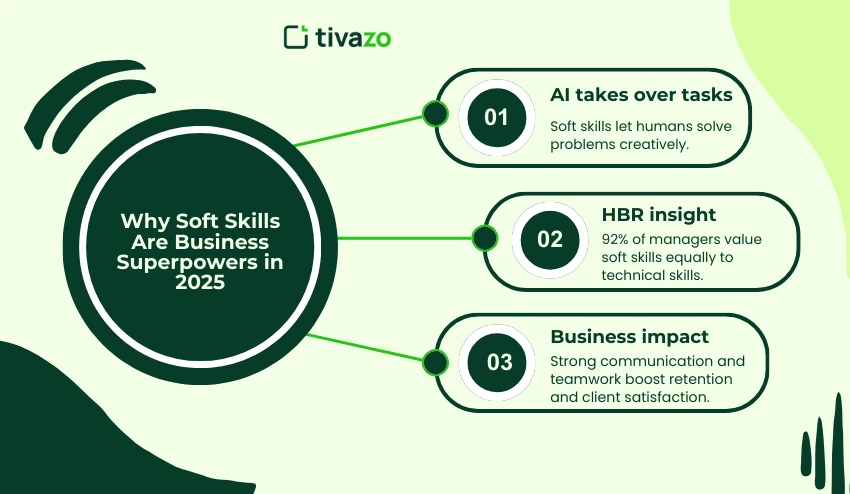
- AI takes over repetitive tasks: Soft skills like problem-solving, adaptability, and radical thinking enable employees to approach new problems and build solutions in ways that machines cannot replicate.
- Harvard Business Review: 92% of hiring managers placed equal importance on soft skills as they did hard skills. This means that interpersonal skills and not just technical skills and knowledge are critically important in hiring and team performance.
- Businesses strong in soft skills see 12% higher retention and 30% higher client satisfaction: Teams that communicate well, collaborate effectively, and can easily navigate conflicts engage employees, ensure client satisfaction, and integrate teamwork have a direct impact on the bottom line.
7 Proven Methods to Assess Soft Skills Effectively
Assessing soft skills goes beyond resumes and interviews. Many of the best organizations employ several strategies to observe candidates’ behaviors, problem-solving strategies, and interactions with others. Here we will discuss the seven most powerful methods in further detail:
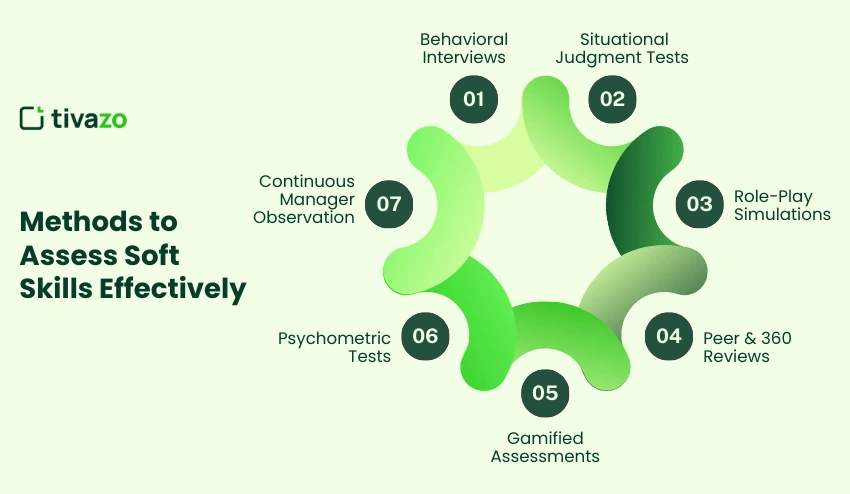
1. Behavioral Interviews
Behavioral interviews focus on past experiences because how someone coped with challenges in the past is a good indication of their future behavior. Posed with questions such as, “Share with me a time you led a team through a challenging project”, recruiters acquire key insights about how candidates think on their feet, problem-solve, lead the team, resolve team conflicts, and make decisions in soft skills assessments under pressure.
2. Situational Judgment Tests
SJTs assess how candidates navigate realistic workplace scenarios. This method allows recruiters to assess not only critical thinking and ethical judgment but also decision-making in a structured environment. For example, if asked how a candidate should address a missed deadline, or how to handle an irate customer, the recruiter gets to see how they think on their feet, prioritize actions, and what potential decisions they make.
3. Role-Play Simulations
Role-play exercises allow for simulations that take on real interactions, including a negotiation with a colleague, a presentation to a client, or a resolution of a team conflict. Watching the candidates in action shows how they communicate, share empathy with others, and demonstrate adaptability and problem-solving processes. Role-play exercises are different from normal theoretical questions because they demonstrate how a candidate acts under pressure, as well as tangible, interactive behavior with others.
4. Peer & 360 Reviews
Gaining input from colleagues, supervisors, or others who are part of the team makes soft skills more visible when compared to using the usual linear viewing angle, as if there are multiple viewing angles; in short, it provides a multi-perspective on a person’s soft skill profile, which is valuable in a soft skills assessment. This forms a picture of a person’s likely strengths and weaknesses with teamwork, reliability, and collaboration from different perspectives and can provide the candidate with a rich picture of their soft skills.
5. Gamified Assessments
Gamified assessments use interactive challenges or online games to replicate similar tasks that are performed in the workplace. Engagement is catered to while revealing a candidate’s problem-solving ability, ability for leadership, ability to work as part of a team, and ability to adapt in an interactive, real-time process. Overall, gamification not only makes the process more engaging, but it also records each candidate’s authentic behaviour when under pressure.
6. Psychometric Tests
Psychometric tests assess emotional intelligence, personality traits, and cognitive ability. The tests examine how candidates will act in various scenarios, whether they will fit the culture, and their growth potential. For instance, someone who scores high on empathy and immediacy will likely be successful in team or client-centric roles.
7. Continuous Manager Observation
Assessing soft skills should not only occur at the time of hiring. Managers should observe performance, behaviour, and development over time. Continuous feedback will allow employees to develop their communication, teamwork, and leadership skills in a meaningful way, which weaves soft skill development into work generically rather than through single instance assessments, strengthening the overall soft skills assessment process.
Best Soft Skills Assessment Tools(2025 Edition)
Assessing soft skills can be intimidating without the right tools. While rare, there are now existing technologies that can examine communication, problem-solving, emotional intelligence, and other important interpersonal skills in less than an hour. Here are some of the best tools and software platforms to assess soft skills in 2025:
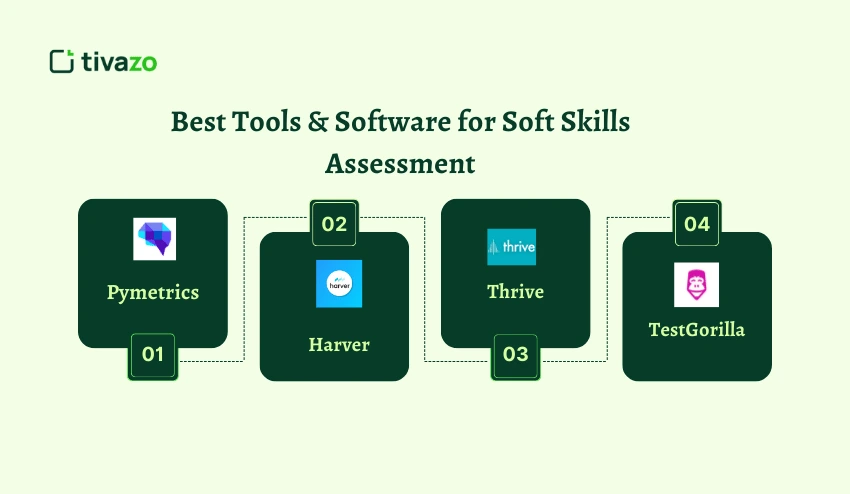
Pymetrics
Pymetrics uses neuroscience-based games powered by AI to individualize candidates’ cognitive and emotional characteristics. Pymetrics prepares fun, interactive games that assess traits such as risk-taking, decision-making, and emotional intelligence. Results yield insights on a candidate’s natural strengths, weaknesses, and job fit.
Harver
Harver is built around situational judgment tests and work simulations. Candidates experience real-world work-based situations to measure problem-solving, decision-making, and communication skills. Harver allows employers to better predict behavior and performance in real job situations, as well as to implement a fairer and accurate selection process.
Thrive
Thrive provides gamified assessments for teams, where candidates or employees can complete team-based challenges. Organized as an experience, these team-based challenges are an exciting way to assess teamwork, communication, adaptability, and leadership, while creating an experience for the candidates and participants.
TestGorilla
TestGorilla offers a well-rounded suite of pre-employment testing that covers hard and soft skills. Their testing library includes personality assessments, situational judgment tests, and cognitive ability tests, meaning that whenever an employer has a clearer insight into a candidate’s potential, cultural fi,t and interpersonal interactions.
Challenges of Assessing Soft Skills
Assessing soft skills is never as clear-cut as simply assessing technical capability. While soft skills are vital to being successful, their intangibility makes it challenging to assess. Here are some of the common challenges and practical solutions:
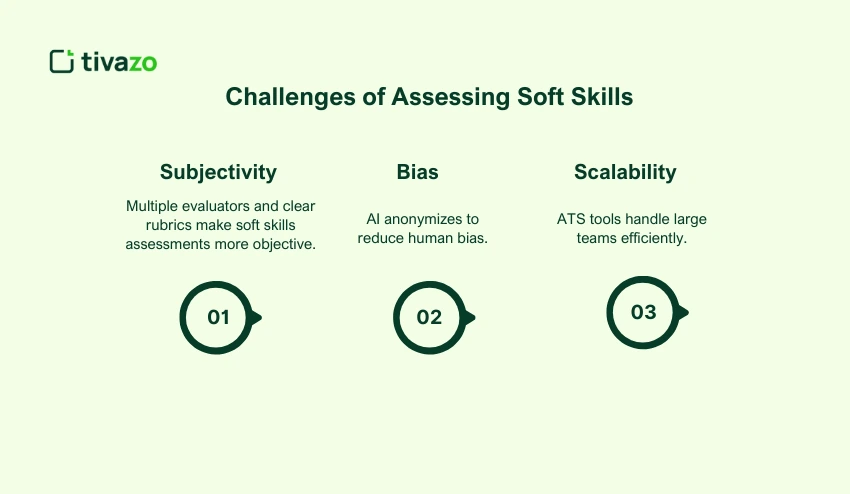
- Subjectivity:
- The nature of soft skills assessments is often subjective. Every manager has a different view as to what “good communication” or “strong leadership” looks like. A clear rubric and multi-rater assessment approach mean that multiple evaluators can rate the same skills together, giving a broader and more balanced, objective view.
- Bias:
- Whether it is conscious or unconscious, bias can be inherited in the evaluation of soft skills. As humans, we can’t help but fall back on what we intuitively know and think, leading us to influences that will not be fair to candidates. AI-driven, anonymized assessments reduce the chance of bias because we focus on measurable behaviors as opposed to personal characteristics, ensuring a fairer and accurate assessment.
- Scalability:
- Evaluating soft skills for larger teams or many candidates can take a lot of time and provide inconsistent outcomes. The problem has been solved by utilizing software tools with Applicant Tracking Systems (ATS), allowing companies to have automated assessments, track progress, and achieve a consistent outcome with many candidates.
How To Assess Soft Skills in an Interview?
Soft skills usually separate a hire who will accelerate and one who will fail. Being systematic in their measuring significantly improves retention, collaboration, and performance.
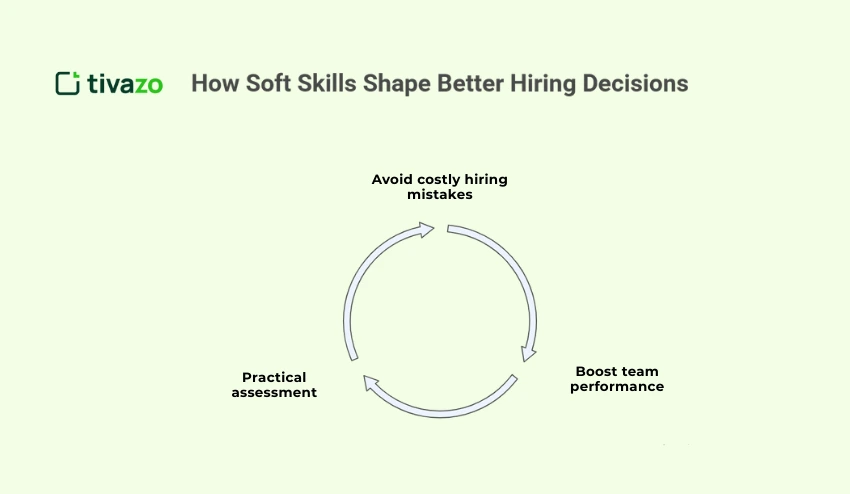
- Avoid costly hiring mistakes: 89% of hiring failures happen because of gaps in soft skills, not deficiencies in technical skills. If you are checking soft skills as part of the process, this tends to limit costly turnover.
- Boost team performance: Younger employees who bring in a diversity of soft skills will have far more success adjacent to innovation, and navigating difficult problem-solving solving leading to better business outcomes and collaboration.
- Practical assessment: As part of using scorecards, you can rate empathy, adaptability, and collaboration, improving your comparison across candidates and limiting subjective thought.
Measuring Soft Skills Assessment in Remote & Hybrid Teams
Measuring soft skills in remote or hybrid teams is more complicated! Managers can miss out on human interactions if they do not see the team member(s) physically face-to-face. Without human interactions, managers really do not see body language and tone, and communication problems can arise.
The simple answer for manager assessments is to apply technology and constructive feedback. Managers can find out what team members think with asynchronous peer reviews, digital collaboration metrics, and engagement insights based on employees’ Slack or Teams sentiments. All this data is valuable even if employees are not physically sharing a workspace.
Managers as Soft Skills Assessment Coaches
In the modern workplace, just assessing soft skills is only part of the equation. Today’s leaders need to coach and develop their teams to improve employee communication, adaptability, and collaboration on the job. Managers who can coach soft skills can foster a culture of continuous improvement and engagement.
- Evolve into coaches: As a manager, utilize their role as a coach to go beyond assessing performance, asking employees to improve their interpersonal skills, problem-solving, and emotional intelligence.
- Action plan: Incorporate soft skills into performance reviews and/or 1:1 meetings, providing feedback regularly and purposefully for continuous improvement, developing goals for employees to work towards, and tracking their progression over time.
Best Practices for Implementing Soft Skills Assessment
To maximize effectiveness when incorporating soft skills assessments, please consider the following best practices:
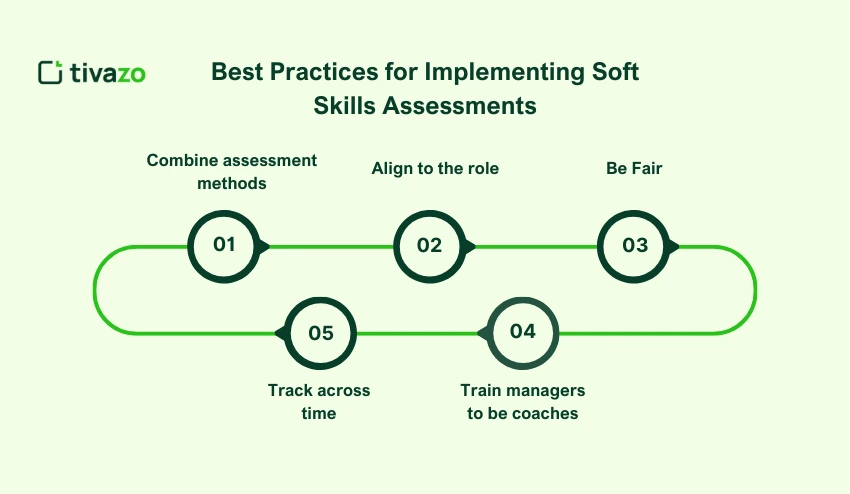
- Combine assessment methods: Put together an assessment that uses tests, interviews, role play, and 360 feedback to provide a clear picture.
- Align to the role: Be clear about the specific soft skill development for each position
- Be fair: Standardize tests and anonymize items to mitigate bias
- Train managers to be coaches: Spend time coaching employees whilst providing feedback, not just assessments
- Track across time: Soft skills and integration can happen over time. Ensure you are tracking and developing soft skills
Conclusion
No longer are soft skills “nice-to-have,” they are critical to team success, encouraging innovation, and driving business growth. Organizations that are intentional about assessing and developing these skills are able to gain a competitive advantage by hiring better, keeping their people longer, and increasing collaboration. By utilizing new tools that provide structured feedback and coaching, leaders can develop soft skills into reliable outcomes that increase productivity, employee engagement, and customer satisfaction. When you invest in soft skills today, you are investing in your organization’s future success.
